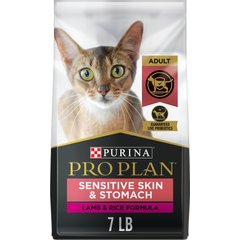Sarcocystis Infection in Cats
Sarcocystosis in Cats
The causative agent of sarcocystosis (Sarcocystis) is the same organism that causes equine protozoal meningitis. Cats that live around horses and other herbivores (cattle, swine, etc.) may serve as a reservoir for infection for these animals. Symptoms in infected cats are rare however.
Sarcocystosis can occur in both dogs and cats. If you would like to learn how this type of infection affects dogs, please visit this page in the petMD health library.
Symptoms and Types
Symptoms in cats are rarely seen but may include:
- Lack of appetite
- Weight loss
- Diarrhea, potentially bloody diarrhea
- Dehydration
- Depression
- Paralysis
Vet Recommended Health Support
- Feliway Optimum Enhanced Calming 30 Day Diffuser for Cats$29.99Chewy Price
- Purina Pro Plan Veterinary Diets FortiFlora Powder Probiotic Digestive Supplement for Cats, 30 count$30.99Chewy Price
- Purina Pro Plan Veterinary Diets Hydra Care Liver Flavored Liquid Supplement for Cats, 3-oz pouch, case of 12$14.99Chewy Price
- Purina Pro Plan Adult Sensitive Skin & Stomach Lamb & Rice Formula Dry Cat Food, 7-lb bag$28.08Chewy Price
Causes
A cat may be infected by eating raw meat contaminated with Sarcocystis organisms.
Diagnosis
Occasionally, Sarcocystis organisms can be seen in the feces on microscopic fecal examination. However, in most instances, diagnosis is accomplished by finding the organism on histopathology in tissues such as the lungs, liver, kidney, spleen, brain and/or muscle.
More specialized testing such as immunohistochemistry and PCR may be available at some research facilities but are not widely available outside of a research setting.
Treatment
No definitive treatment for sarcocystosis exists. Treatments such as clindamycin or sulfadiazine may be tried if sarcocystosis is suspected or diagnosed.
Prevention
Do not allow your cat to eat raw or uncooked meat.



